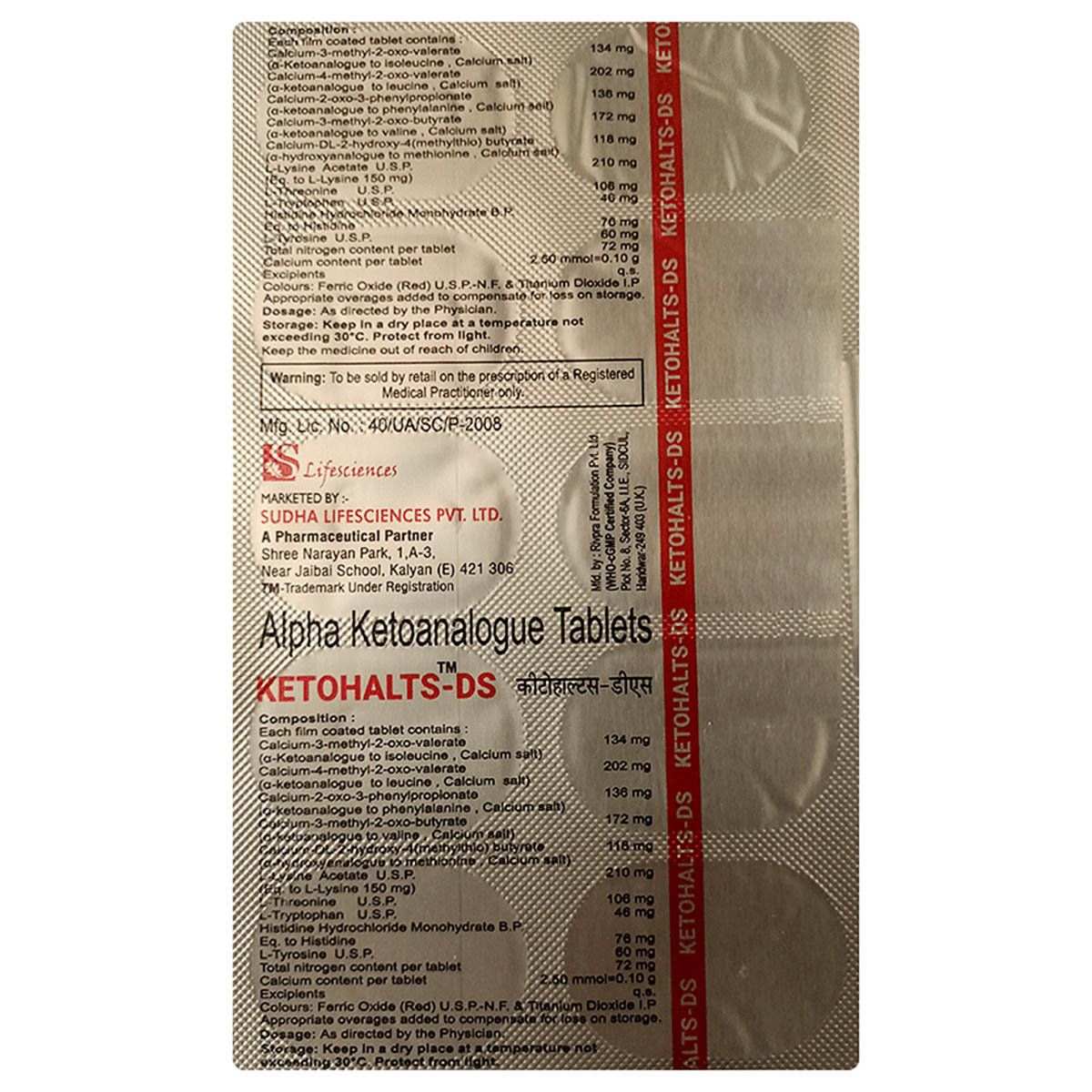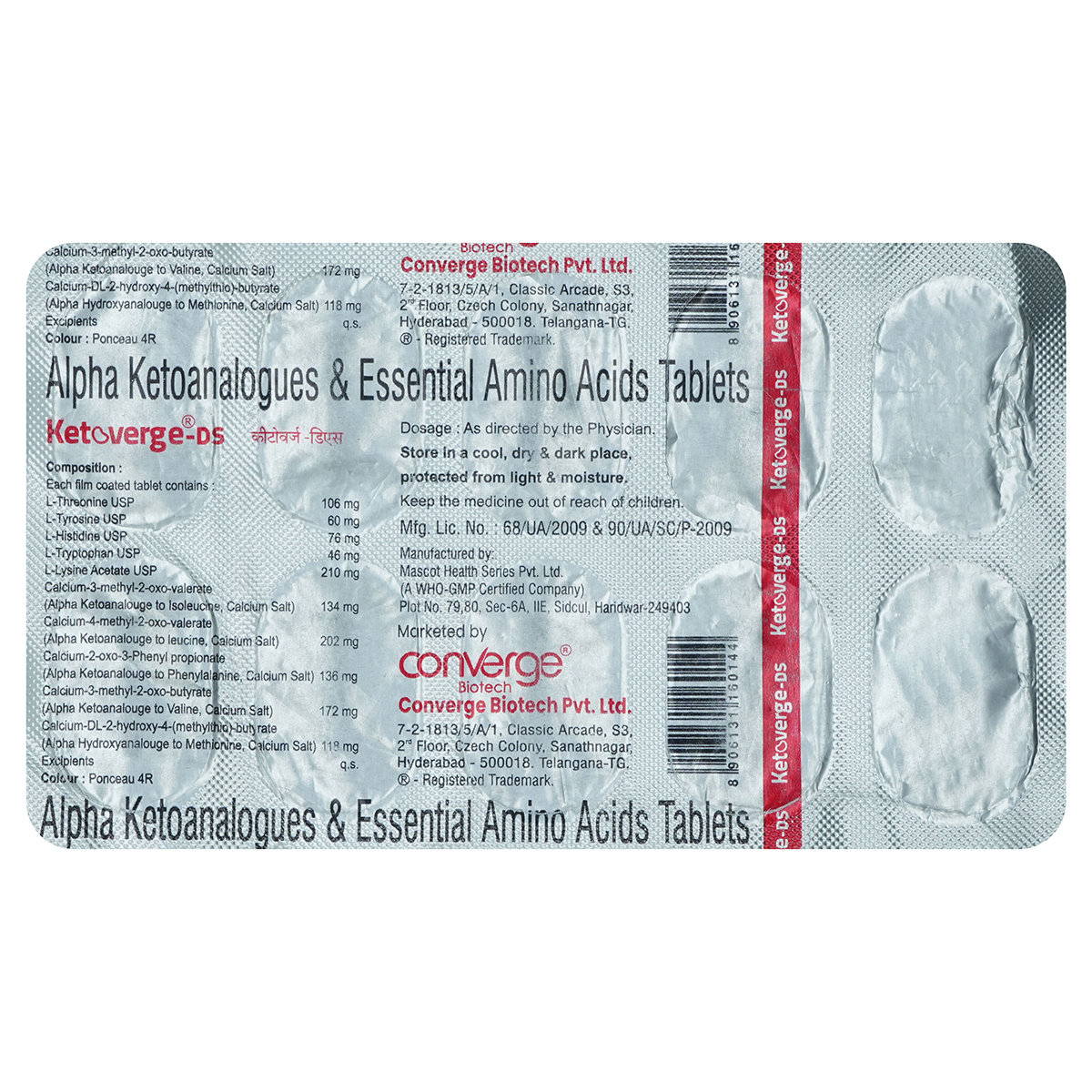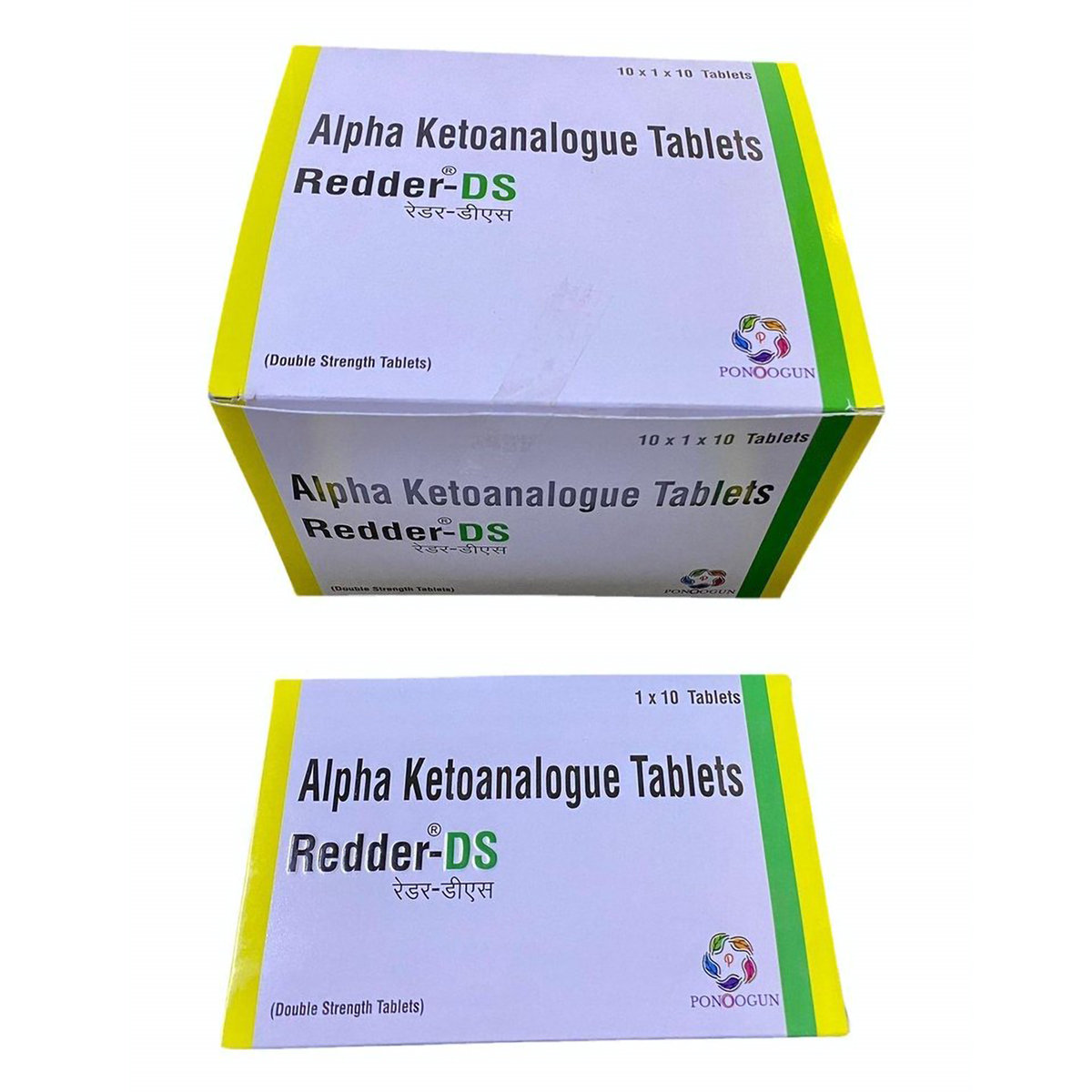- Home
- Renostrong-DS Tablet
Renostrong-DS Tablet Substitute
Renostrong-DS Tablet Substitute
Medicine Composition:
ALPHA KETOANALOGUE-762MG+L HISTIDINE-76MG+L LYSINE-150MG+L THREONINE-106MG+L TRYPTOPHAN-46MG+TYROSINE-60MGAll Substitutes & Brand Comparisons
RX
Ketohalts-DS Tablet 10's
Sudha Lifesciences Pvt Ltd
₹490
(₹44.1 per unit)
23% CHEAPERRX
Ketomune DS Tablet 10's
Immune Biotech Pvt Ltd
₹583
(₹52.47 per unit)
8% CHEAPERRX
Ketoverge-DS Tablet 10's
Converge Biotech Pvt Ltd
₹657
(₹59.13 per unit)
2% COSTLIERRX
Pospondyl-DS Tablet 10's
Hospimax Healthcare Pvt Ltd
₹690
(₹62.1 per unit)
7% COSTLIERRX
Out of StockNuketo DS Tablet 10's
Vyapitus Specialities Pvt Ltd
₹700
(₹63.0 per unit)
9% COSTLIERRX
Alfakit DS Tablet 10's
Plasoron Biotech Pvt Ltd
₹739
(₹66.51 per unit)
15% COSTLIERRX
Redder-Ds Tablet 10's
Ponoogun Healthcare Pvt Ltd
₹780
(₹70.2 per unit)
21% COSTLIERRX
Neflog-DS Tablet 10's
Merynova Life Sciences India Pvt Ltd
₹795
(₹71.55 per unit)
24% COSTLIER

When Should You Consider Switching from Renostrong-DS Tablet ?
Patients may explore substitutes in the following scenarios:
- High monthly cost of Renostrong-DS Tablet
- Non-availability in local pharmacies
- Generic recommendation by a doctor
- Side effects or better tolerability with alternatives
What to Know Before Switching
Before you switch from Renostrong-DS Tablet to another medicine, here are some important points to keep in mind:
Same salt, different brands:
Most substitutes contain the same active ingredient - ALPHA KETOANALOGUE-762MG+L HISTIDINE-76MG+L LYSINE-150MG+L THREONINE-106MG+L TRYPTOPHAN-46MG+TYROSINE-60MG, but the fillers, coating, or manufacturing quality may vary slightly.
Consult your doctor first:
Even if the salt is the same, your doctor can confirm if the substitute is right for your condition, dosage, and health history.
Watch out for allergies or reactions:
Some people may react differently to certain brands due to inactive ingredients. If you notice any side effects, inform your doctor immediately.
Price ≠ effectiveness:
A lower-priced substitute doesn't mean it's less effective. Many generic medicines work just as well as branded ones.
Check the dosage form and strength:
Always match the substitute’s strength (e.g., 5mg, 10mg) and form (tablet, capsule, syrup) with what your doctor prescribed.
Uses
Renostrong-DS Tablet is used in the treatment of Chronic Kidney Disease. The detailed uses of Renostrong-DS Tablet are as follows:
- Manage chronic kidney disease (CKD): Renostrong-DS Tablet is primarily used to support kidney function in patients with CKD, especially those on low-protein diets. It helps reduce the buildup of nitrogenous waste and delays the progression toward dialysis.
- Provide essential amino acids without increasing nitrogen load: Renostrong-DS Tablet contains keto analogues and amino acids that allow the body to synthesise proteins efficiently while minimising urea production, easing the burden on impaired kidneys.
- Prevent protein-energy malnutrition: Renostrong-DS Tablet helps maintain nutritional balance and muscle strength in CKD patients by supplying key amino acids like lysine, threonine, and tryptophan.
- Reduce uremic symptoms and improve metabolic balance: Renostrong-DS Tablet lowers urea levels and supports better protein metabolism, which can alleviate symptoms like fatigue, nausea, and muscle wasting.
Medicinal Benefits
- Renostrong-DS Tablet helps improve renal function by reducing the burden on the kidneys and promoting healthier metabolism.
- It prevents unnecessary accumulation of urea in the blood, which is a common complication in chronic kidney disease (CKD).
- By enhancing protein metabolism, Renostrong-DS Tablet helps reduce the production of toxic waste products in the body.
- When used in combination with a low-protein diet, Renostrong-DS Tablet can slow down the progression of chronic kidney disease, potentially delaying the need for dialysis.
- Renostrong-DS Tablet helps patients manage nutritional imbalances often associated with CKD, ensuring better overall health.
FAQs
The substitutes of Renostrong-DS Tablet contain the same active salt(s) - ALPHA KETOANALOGUE-762MG+L HISTIDINE-76MG+L LYSINE-150MG+L THREONINE-106MG+L TRYPTOPHAN-46MG+TYROSINE-60MG. However, they may differ in price, manufacturing quality, and inactive ingredients. Speak to your doctor to find a suitable option.
Switching to a generic substitute medicine in the place of Renostrong-DS Tablet is often possible if it has the same salt, strength, and dosage form. But always check with your doctor before making any changes to your medication.
Generics versions of Renostrong-DS Tablet are typically more affordable because they don’t include the original brand's research, development, and marketing costs. They contain the same active ingredient and are approved for safety and effectiveness.
Most people don’t notice any difference. However, some may react to different fillers or coatings. If you notice any unusual symptoms after switching, consult your doctor.
Make sure the new medicine has the same active salt, strength, dosage form. Always confirm the change with your doctor or pharmacist.
Substitutes of Renostrong-DS Tablet meet the same safety and efficacy standards as Renostrong-DS Tablet , but small differences in absorption or formulation can exist. A doctor can help you choose the right one for your needs.
Yes. Substitutes of Renostrong-DS Tablet may vary in color, size, or shape due to differences in manufacturing and branding, but this does not affect how they work.
Yes, it’s generally safe to switch between multiple substitutes of Renostrong-DS Tablet if they have the same salt and strength. However, always inform your doctor so they can monitor how your body responds.
Yes, many people safely use substitutes of Renostrong-DS Tablet for long-term treatment. Just ensure it’s done under medical supervision.
If your symptoms stay under control or lab results remain stable, the substitute for Renostrong-DS Tablet is likely working well. Regular follow-ups with your doctor are important.
Absolutely. Even with the same salt, small differences can affect how your body responds when switching from Renostrong-DS Tablet to its substitute. Always consult your doctor before switching.
Renostrong-DS Tablet is used in the treatment of chronic kidney disease.
Renostrong-DS Tablet mimics the same catabolic (protein destruction) pathways as amino acids and works by enhancing protein metabolism, thereby improving renal function.
To treat your condition effectually, continue taking Renostrong-DS Tablet for as long as your doctor has prescribed. Please do not stop taking Renostrong-DS Tablet without consulting your doctor.
CKD is usually caused by various conditions such as high blood pressure, diabetes, high cholesterol, kidney infections, kidney inflammation, kidney stones that keep coming back, or an enlarged prostate, long-term, regular use of certain medicines, such as lithium and non-steroidal anti-inflammatory drugs (NSAIDs).
CKD can be diagnosed using blood and urine tests such as glomerular filtration rate, serum creatinine levels and blood tests for urea nitrogen.
There are usually no symptoms of kidney disease in the early stages. At a more advanced stage, symptoms can include tiredness, swollen ankles, feet or hands, shortness of breath, feeling sick, and blood in the urine.
Buy best Nutrition & Metabolism products by
OTHER SUPPLEMENTS
HEMATINICS
BONE & JOINT SUPPLEMENTS
WOMEN HEALTH SUPPLEMENTS
GASTRIC DISORDERS SUPPLEMENTS
AMINO ACID SUPPLEMENTS
IMMUNE HEALTH SUPPLEMENTS
WEIGHT LOSS AND WEIGHT GAIN
CARDIAC SUPPLEMENTS
VITAMINS AND MINERALS
DIABETICS SUPPLEMENTS
RESPIRATORY DISEASE SUPPLEMENTS
APPETITE SUPPRESSANTS
NUTRITIONAL SUPPLEMENTS
La Renon Healthcare Pvt Ltd
Alniche Life Sciences Pvt Ltd
Fourrts India Laboratories Pvt Ltd
Intas Pharmaceuticals Ltd
Abbott India Ltd
Mankind Pharma Pvt Ltd
East West Pharma India Pvt Ltd
Vasu Organics Pvt Ltd
Eris Life Sciences Ltd
Sanatra Healthcare Ltd
Koye Pharmaceuticals Pvt Ltd
Leeford Healthcare Ltd
Aristo Pharmaceuticals Pvt Ltd
Elder Pharmaceuticals Ltd
Lyceum Life Sciences Pvt Ltd
Macleods Pharmaceuticals Ltd
Aarux Pharmaceuticals Pvt Ltd
Alkem Laboratories Ltd
Gh Vision Care Life Sciences
Intra Life Pvt Ltd
Linux Laboratories Pvt Ltd
Olcare Laboratories Pvt Ltd
Venera Pharma
Akumentis Healthcare Ltd
Cadila Healthcare Ltd
Capital Pharma
Emcure Pharmaceuticals Ltd
Hetero Healthcare Pvt Ltd
Meyer Organics Pvt Ltd
Prevego Healthcare & Research Pvt Ltd
Sun Pharmaceutical Industries Ltd
Tricept Life Sciences Pvt Ltd
Ajanta Pharma Ltd
Albert David Ltd
DR Johns Lab Pharma Pvt Ltd
Gynofem Healthcare Pvt Ltd
Msn Laboratories Pvt Ltd
Ponoogun Healthcare Pvt Ltd
Truhealthy Llp
Ardent Life Sciences Pvt Ltd
BSA Pharma Inc
Brio Bliss Life Science Pvt Ltd
Converge Biotech Pvt Ltd
Jupiter Biolabs Pvt Ltd
Olympus Therapeutics Pvt Ltd
Syndicate Life Sciences Pvt Ltd
Tas Med India Pvt Ltd
Zydus Cadila
Astrum Healthcare Pvt Ltd
Biological E Ltd
Butson Biosciences
Chemo Healthcare Pvt Ltd
Cipla Ltd
Dr Reddy's Laboratories Ltd
Fresenius Kabi India Pvt Ltd
Innovcare Life Sciences Pvt Ltd
Mediart Life Sciences Pvt Ltd
Medley Pharmaceuticals Ltd
Micro Labs Ltd
Modi Mundipharma Pvt Ltd
Rhine Biogenics Pvt Ltd
Steris Healthcare
Unipark Biotech Pvt Ltd
Yuventis Pharmaceuticals
Zee Laboratories Ltd
Zydus Healthcare Ltd
Aggrowin Pharma
Alembic Pharmaceuticals Ltd
Bioceutics Inc
Celera Pharma Pvt Ltd
Daris Biocare
Edence Life Sciences Pvt Ltd
Femura Pharmaceuticals Pvt Ltd
Genix Lifescience Pvt Ltd
Gladstone Pharma India Pvt Ltd
Hymax Healthcare Pvt Ltd
Indoco Remedies Ltd
Ipca Laboratories Ltd
Larivin Pharma Pvt Ltd
Maxamus Pharma Pvt Ltd
Menschlich Healthcare (Opc) Pvt Ltd
Neiss Labs Ltd
Sherim Squibss Pharmaceuticals
Solarium Pharmaceuticals
Torrent Pharmaceuticals Ltd
Winmark Healthcare Pvt Ltd
Adonis Phytoceuticals Pvt Ltd
Alteus Biogenics Pvt Ltd
Aurel Biolife
British Biologicals
Cnx Health Care Pvt Ltd
Corona Remedies Pvt Ltd
Esper Lifescience Pvt Ltd
Estragen Pharma Pvt Ltd
Glenmark Pharmaceuticals Ltd
Himerus Medical Solutions Llp
Hospimax Healthcare Pvt Ltd
Jagsam Pharma
Knoll Healthcare Pvt Ltd
Lupin Ltd





